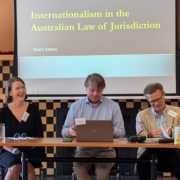AAPrIL’s Feb 2026 Seminar: Pitel on ‘Reconsidering the “Proper Party” Basis for Jurisdiction’
On Thursday 12 February 2026, the Australasian Association of Private International Law (AAPrIL) is hosting its first seminar of 2026, as Professor Stephen Pitel presents free online and in-person (Qld, Australia) on the topic, ‘Reconsidering the “Proper Party” Basis for Jurisdiction’.
Abstract:
In several jurisdictions the fact that a defendant is a ‘proper party’ to a legal proceeding constitutes a sufficient basis for taking jurisdiction over that defendant. Advocates of the proper party basis rely on considerations of fairness and efficiency to support it. Do these considerations support the proper party basis, especially if it is given a wide scope? Recently Canadian courts have been reconsidering their approach to the proper party basis, as seen (somewhat opaquely) in Sinclair v Venezia Turismo, 2025 SCC 27. This presentation will explore that reconsideration and offer thoughts for changes in other jurisdictions including Australia and New Zealand.
Chair:
Mary Keyes is Professor of Law at Griffith University, and President of AAPrIL. She is a leading scholar on questions of international jurisdiction and international family law. Mary is co-author of Private International Law in Australia, and is a member of the Working Group on Jurisdiction at the Hague Conference on Private International Law.
Presenter:
Stephen Pitel Stephen G.A. Pitel is a Professor in the Faculty of Law at Western University. His research and teaching are focused on private international law, tort law, civil procedure and legal ethics. Stephen is the author of Conflict of Laws (3rd ed. 2025) and co-author of Private International Law in Common Law Canada: Cases, Text and Materials (5th ed. 2023) and Statutory Jurisdiction: An Analysis of the Court Jurisdiction and Proceedings Transfer Act (2012). His tort law scholarship includes co-authoring Fridman’s The Law of Torts in Canada (4th ed. 2020) and Cases and Materials on the Law of Torts (11th ed. 2023). In the field of legal ethics, Stephen is a contributor to Lawyers’ Ethics and Professional Regulation (4th ed. 2021). He is a former President of the Canadian Association for Legal Ethics.
Details:
Date and time: Thursday 12 February 2026, 5:00pm to 6:00pm (AEST)*
Date and time Thursday 12 February 2026, 5:00pm to 6:00pm (AEST)
in person: Griffith University, Southbank, Brisbane: Room 4.03 Building S07. The map is available here.
RSVP (essential): Please register via this link by COB Wednesday 11 February 2026, and advise whether you are attending in person or online. Please access the Teams link here. There is no cost.
* NZ. 8:00pm-9:pm; ACT, NSW, Tas and Vic. 6:00pm-7:00pm; SA, 5:30pm-6:30pm; Qld, PNG. 5:00pm-6:00pm; NT, 4:30pm-5:30pm; WA, 3:00pm-4:00pm







